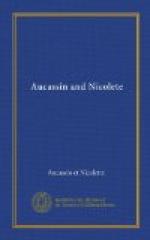When Aucassin heard that, he was right glad thereof. And she departed from him, and went into the city to the house of the Captain’s wife, for the Captain her father in God was dead. So she dwelt there, and told all her tale; and the Captain’s wife knew her, and knew well that she was Nicolete that she herself had nourished. Then she let wash and bathe her, and there rested she eight full days. Then took she an herb that was named Eyebright and anointed herself therewith, and was as fair as ever she had been all the days of her life. Then she clothed herself in rich robes of silk whereof the lady had great store, and then sat herself in the chamber on a silken coverlet, and called the lady and bade her go and bring Aucassin her love, and she did even so. And when she came to the Palace she found Aucassin weeping, and making lament for Nicolete his love, for that she delayed so long. And the lady spake unto him and said:
“Aucassin, sorrow no more, but come thou on with me, and I will shew thee the thing in the world that thou lovest best; even Nicolete thy dear love, who from far lands hath come to seek of thee.” And Aucassin was right glad.
Here singeth one:
When Aucassin heareth now
That his lady bright of brow
Dwelleth in his own countrie,
Never man was glad as he.
To her castle doth he hie
With the lady speedily,
Passeth to the chamber high,
Findeth Nicolete thereby.
Of her true love found again
Never maid was half so fain.
Straight she leaped upon her feet:
When his love he saw at last,
Arms about her did he cast,
Kissed her often, kissed her sweet
Kissed her lips and brows and eyes.
Thus all night do they devise,
Even till the morning white.
Then Aucassin wedded her,
Made her Lady of Biaucaire.
Many years abode they there,
Many years in shade or sun,
In great gladness and delight
Ne’er hath Aucassin regret
Nor his lady Nicolete.
Now my story all is done,
Said and sung!
NOTES
“THE BLENDING”—of alternate prose and verse—“is not unknown in various countries.” Thus in Dr. Steere’s Swahili Tales (London, 1870), p. vii. we read: “It is a constant characteristic of popular native tales to have a sort of burden, which all join in singing. Frequently the skeleton of the story seems to be contained in these snatches of singing, which the story-teller connects by an extemporized account of the intervening history . . . Almost all these stories had sung parts, and of some of these, even those who sung them could scarcely explain the meaning . . . I have heard stories partly told, in which the verse parts were in the Yao and Nyamwezi languages.” The examples given (Sultan Majnun) are only verses supposed to be chanted by the characters in the tale. It is improbable that the Yaos and Nyamwezis borrowed the custom of inserting verse into prose tales from Arab literature, where the intercalated verse is usually of a moral and reflective character.




